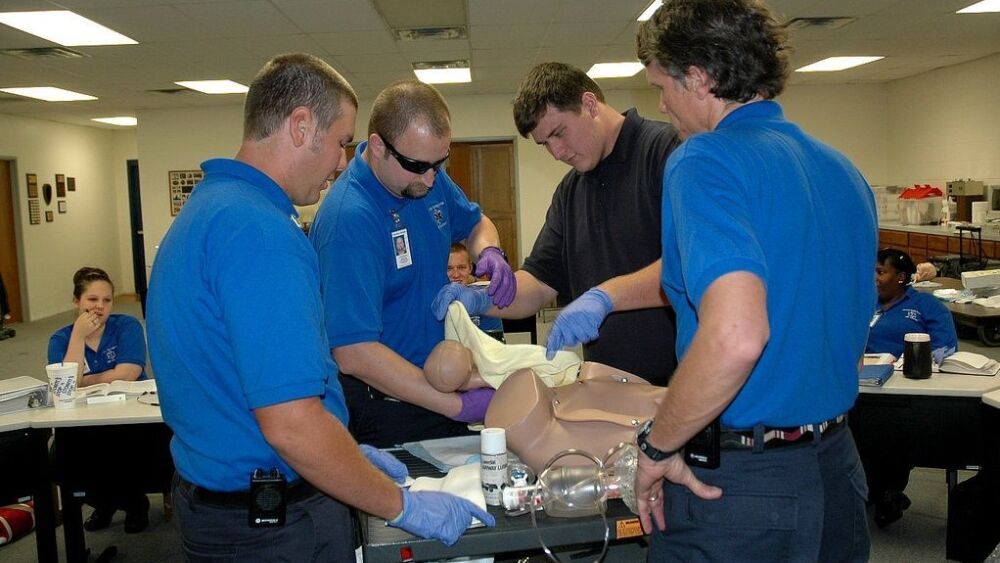The NREMT announced in the summer of 2021 that the ALS psychomotor exam would be discontinued in phases, culminating in 2023.
In a recent article, Kelly Grayson noted this is a good thing – if we let it be. Instructors have taught psychomotor skills for a couple of generations as a recipe to be followed, Grayson writes. “Rote memorization of steps and parroting of arcane phraseology took precedence over actual skill or understanding. EMS instructors treated the NREMT psychomotor skill sheets as a recipe, and EMT students dutifully memorized those skill sheets, as if following the recipe to the letter made them skilled practitioners.”
The reader response has been wide and varied, from, “it’s about time,” to “big mistake.” What do you think?
Learn and share:
- Read why Kelly supports discontinuing the psychomotor exam
- Download Kelly’s guide to ditching wrote memorization by creating an EMT evaluation rubric
- Weigh in on our poll: Is this good for EMS?
- Add your comments below
Psychomotor exam: What readers had to say
“The article doesn’t thank the hundreds of meetings across the country between agency directors, EMS associations and government representatives etc. Meetings that have discussed removing the NREMT (which is a vendor) as it’s source of testing and credentialing. Now the NREMT is listening, because in those meetings they were not important, and better options were being planned.”
— Scott Dunlap
“Call me old, I don’t care. Big mistake.”
— Kevin Edwards
“So the exam is not the issue. It is the services that fail to enact a true FTO program that teaches the critical application which is the true issue.
“The test is the basement and the absolute showing of the minimum knowledge necessary. No one comes out of an academy or class with all of the skills, training, and actual critical skills necessary to be successful. That comes from application of skills in an environment of mentorship and application of organizational standards. Career firefighters are probies for a reason. Newly qualified street cops go on FTO for months. Doctors have 4 years of residency.
“All of these programs and academys come with skills evaluations that are memorized to pass a test. That memorization enables muscle memory of a base skill. They then go to the field as probationary members where they are taught and mentored to think critically in the field and taught to effectively apply those base skills.
“The main issue is services are more interested in filling holes in schedules and on ambulances, than they are actually training the next generation to do the job. The test can always be improved, but this is a hands on job that requires a robust hands on test.
“We as the services fail to enact actual FTO programs and training that are effective in teaching our new members to think critically. We have weak leadership within our services that fail the new members by not enforcing standards and training new members appropriately. The test is not the problem. The problem is our assumption of what the test is. And the failure is ours as senior providers and service mangers.”
— Jason A Tartalone
“Jason A Tartalone I completely agree. I am a part time instructor and I put my heart and soul into making sure my EMT students are able to critically think and respond appropriately to random and weird situations. Then, when I train other new EMTs on the job, I try to do the same, allowing and urging them to take patient care, lead a call, reassess, write reports and everything in between. I often find myself frustrated by the lack of willingness, motivation and self discipline by new providers to WANT to step up and do while they have an experienced trainer with them. It’s almost like they’d rather sit back and watched me work. I’ve even heard some say it’s hard to learn on 3 man. That’s when you SHOULD be learning! I try to give the opportunities and encourage new people to step up and learn, especially on less critical patients, or hand them meds to give to someone who needs them. When they look at me clueless as to how to actually give the med, I walk them through what to do. I always reaffirm I’m not going to let them do it wrong, but THEY need to do it and this is the best time for them to do it and build their comfort level. When they end up on 2 man with no experience and completely clueless is not the best time to get a critical patient. When I ask my partner on 2 man to administer epilepsy while I’m doing ALS care, I don’t need them staring at me looking clueless. I expect them to have a clue and start doing what THEY are qualified to do. On the critical call is not the time to decide they don’t know what they are doing.
— Rachael Mueller
“About time. We were the only medical profession that was doing that as a part of a final exam.”
— Kevin Peters
“It’s about time. It is a dysfunctional rite of passage at best”
— Charles Whittaker
“I don’t think the skills sheets need to be replaced. That is used for a start and then u learn to grow from there. It is merrily a guide line to go by. That’s what made us the medics and emts we are. Company’s now days are having to train employees what they should have learned in school. This is only going to make it worse.”
— Clay Bell
“We need to be evaluating these students in the field. Putting more on preceptor evaluations. Evaluating their skills on real patient’s. And NREMT needs a better test.”
— Jimmy Futrelle
“Psychomotor skills sheets were never intended to create a robotic clinician. They are used to create the foundation/frame work needed in the learning phase for each person to mature from and build upon. Every trauma patient being immobilized back in the day may have been on the psychomotor sheet but only because that was the prescribed standard of care for that era. The article makes it sound like skill sheets made us do it. That’s like blaming the need for sterility while starting an IV on a skill sheet. I suppose this new rationale is the common core EMS equivalent.”
— Jim Brown
“I do think you learn more by doing the skills and not just the psychomotor skills test. If they do away with that completely, are they going to require more clinical hours?…. In my state, they go by the NREMT requirements for our renewal for state licenses. It makes it easy to just have 1 set of CEUs to keep up.”
— Jessica Mehrie
“A good decision thats overdue. We know its simply not necessary and difficult to administer in a consistent manner. I was a NREMT Represntative and the wild card on psychomotor exams was always the the inconistent performance of skill evaluators.”
— Lloyd Parker
“About time!”
— Carolina Jeanette Benson
What are your thoughts about ending the psychomotor exam? Leave a comment below.
Read next:
Whatever will we do without the skill sheets?
NREMT is discontinuing the ALS psychomotor exam. That’s a good thing, if you let it be














